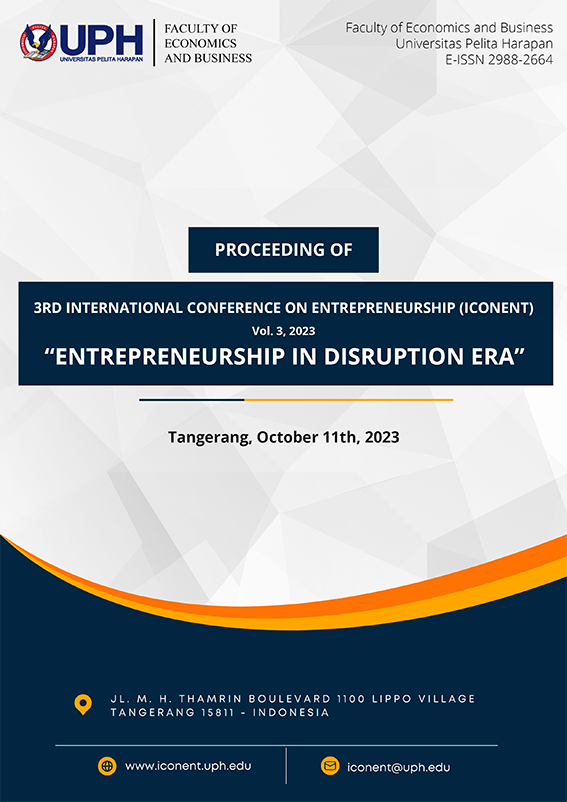Prediction of the Relationship of Peer Group and Family Economic Education to Entrepreneurial Intention: Economic Literacy as an Mediating Variable
Keywords:
entrepreneurial intention, economic literacy, peer groups, family economic educationAbstract
Entrepreneurship is one of the main factors that can support economic growth, business opportunities, and others. However, the number of entrepreneurs in Indonesia is still lagging compared to the number of entrepreneurs in other Asian countries. Therefore, this study aims to examine the relationship between family and peer group financial education mediated by financial literacy and entrepreneurial intentions. This study uses a quantitative method where data is collected through an electronic questionnaire. There were 160 respondents in this study who were students from several universities in Jakarta and Tangerang. After checking the reliability and validity of the data, hypothesis testing was carried out using PLS-SEM. The results of the analysis show that there is one of the seven research hypotheses that are not supported. This study supports that family economic education and peer groups have a positive relationship with economic literacy. Furthermore, family economics, peer groups, and economic literacy are directly related to entrepreneurial intentions. The results of the analysis also show that economic literacy mediates the relationship between peer groups and entrepreneurial intentions. However, the results of the analysis show that economic literacy does not mediate the relationship between family economic education and entrepreneurial intention.
References
[1] Antaranews, Indonesia to have advanced economy with more entrepreneurs: VP, 2021. Retrieved from: https://en.antaranews.com/news/190993/indonesia-to-have-advanced-economy-with-more-entrepreneurs-vp
[2] Yasa, I.N.K, Sukaatmadja, I.P.G. and Rahmayanti, P.L.D., Pendidikan Kewirausahaan Untuk Membangun Orientasi Kewirausahaan, Sikap, dan Niat Berwirausaha Mahasiswa, Klaten: Penerbit Lakeisha, 2022.
[3] Arrighetti, A., Caricati, L., Landini, F. and Monacelli, N., Entrepreneurial intention in the time of crisis: a field study, International Journal of Entrepreneurial Behavior & Research, Vol. 22 No. 6, pp. 835-859, 2016. https://doi.org/10.1108/IJEBR-12-2015-0326
[4] Yi, G., From green entrepreneurial intentions to green entrepreneurial behaviors: The role
of university entrepreneurial support and external institutional support. International
entrepreneurship and management journal, 1-17, 2020.
[5] Dilek, S.; Küçük, O. and Eleren, A., Kastamonu Üniversitesi Öğrencilerinin Ekonomi Okuryazarlığı. İnsan ve
Toplum Bilimleri Araştırmaları Dergisi. 5(7), 1865-1878, 2016.
[6] Surendar, G. and Sarma, V.V.S., Financial literacy and financial planning among teachers of higher education. International Journal of Pure and Applied Mathematics, 118 (18), 1627-1649, 2018.
[7] Rahmatullah, R., Inanna, I., and Ampa, A.T., How Informal Education Fosters Economic Awareness in Children. Dinamika Pendidikan, 15 (2), 202-214, 2020.
[8] Wahjoedi, Suyono, A., Prakoso, A.F., Utama, A.P. and Rosy, B., Problematika pendidikan ekonomi: suatu analisis dan kajian praktis, Lamongan: Penerbit Academia Publication, 2022.
[9] Nesi, J., Choukas-Bradley, S. and Prinstein, M.J. Transformation of Adolescent Peer Relations in the Social Media Context: Part 2””Application to Peer Group Processes and Future Directions for Research, Clin Child Fam Psychol Rev, 21, 295-319, 2018. https://doi.org/10.1007/s10567-018-0262-9
[10] Ermawati, I. Pengaruh Peer Group Terhadap Hasil Belajar Siswa Kelas VIII di MTS Mu’Allimat NU Kudus Tahun Ajaran 2019/2020. Kudus: Institut Agama Islam Negeri Kudus, 2020.
[11] Jadmiko, Ta., Djaelani, A. R. and Apriyanto, N. Pengaruh Hasil Belajar
Kewirausahaan Dan Pelayanan Informasi Bursa Kerja Khusus (BKK ) Terhadap Minat
Berwirausaha. Journal of Vocational Education and Automotive Technology, 1(2), 74-82, 2019. http://e-journal.ivet.ac.id/index.php/joveat/article/download/1051/812
[12] Kristianti, N., Prihatini, D., & Utami, E. S. (2021). The Effect of Entrepreneurial Motivation and Family Environment through Self-Efficacy on Entrepreneurial Interest of Scholarship Recipients at Bank Indonesia Jember Representative Office. OSR Journal of Business and Management, 23(12), 24-29. https://doi.org/10.9790/487X-2312042429
[13] Suratno, Narmaditya, B. S., & Wibowo, A. (2021). Family economic education, peer groups and students’ entrepreneurial intention: the mediating role of economic literacy. Heliyon, 7(4), e06692. https://doi.org/10.1016/j.heliyon.2021.e06692
[14] Kurniawan, D. and Damayani, S. M., The Effectiveness of Financial Content on Youtube Towards Financial Literacy, Financial Behavior, and
How It Influences Generation Z Financial Decision in Indonesia During Pandemic. International Journal of Accounting, Finance and Business, 7(43), 275 - 296, 2022.
[15] Munthasar, M., Hasnita, N. andYulindawati, Y., Pengaruh Pengetahuan Dan Pendidikan Terhadap Literasi Keuangan Digital Masyarakat Kota Banda Aceh, Jihbiz: Global Journal of Islamic Banking and Finance, 3(2), 146-157, 2021.
[16] Fajriyah, I.L and Listiadi, A., Pengaruh uang saku dan pendidikan keuangan keluarga terhadap pengelolaan keuangan pribadi melalui literasi keuangan sebagai intervening. Jurnal Inovasi, 17(1), 61-72, 2021.
[17] Nabi, G., Walmsley, A., Akhtar, F.L.I. and Neame, C., *Does entrepreneurship education in the first year of higher education develop entrepreneurial intentions? The role of learning and inspiration, Studies in Higher Education, 43:3, 452-467, 2018. DOI: 10.1080/03075079.2016.1177716
[18] Handayati, P., Wulandari, D. Soetjipto, B.E., Wibowo, A. and Narmaditya, B.S. Does entrepreneurship education promote vocational students’ entrepreneurial mindset? Heliyon, 6, e05426, 2020.
[19] Muslimin, F., Hanum, F. and Septia, A.Q., The Effect of Economic Literacy, Peer Groups, and Parents Socioeconomic Status Towards Students Consumption Behavior, Dinamika Pendidikan, 15(1), 2020.
[20] Pohan, M., Jufrizen, J., and Annisa, A., The Effect of Self-Concept, Peer Groups, Lifestyle on Consumptive Behavior Moderated by Financial Literacy. Proceedings of the National Seminar on Entrepreneurship, 2(1), 402-419, 2021.
[21] Nurbaeti, I., Mulyati, S. and Sugiharto, B., The effect of financial literacy and accounting literacy to entrepreneurial intention using theory of planned behavior model in stie sutaatmadja accounting students. JASS (Journal of Accounting for Sustainable Society), 1(01), 1, 2019. https://doi.org/10.35310/jass.v1i01.65
[22] Rahmatullah, R., Inanna, I. and Ampa, A.T., How Informal Education Fosters Economic Awareness in Children, Dinamika Pendidikan, 15(2), 2020.
[23] Jiang, L. and Zhen, Z., Peer groups, social support, and well-being: evidence from a large online maternity community, ISER Working Paper Series 2021-01, Institute for Social and Economic Research, 2021.
[24] Audretsch, D. B. Entrepreneurship: A survey of the literature for the European Commission, Enterprise Directorate General, 2002. URL. http://europa.eu.int/comm/enterprise/library/enterprise-papers/pdf/enterprise _paper_14_2003.pdf

 Fakultas Ekonomi dan Bisnis | Universitas Pelita Harapan | Kampus Universitas Pelita Harapan | Gedung F Lt. 12 | Lippo Karawaci, Tangerang - 15811 | Telp 021-5460901 | Fax 54210992
Fakultas Ekonomi dan Bisnis | Universitas Pelita Harapan | Kampus Universitas Pelita Harapan | Gedung F Lt. 12 | Lippo Karawaci, Tangerang - 15811 | Telp 021-5460901 | Fax 54210992